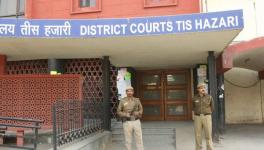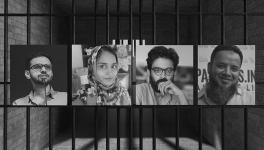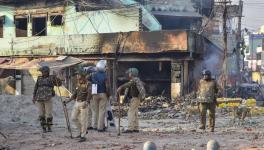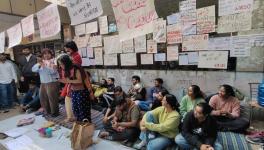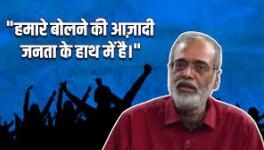Delhi Violence: Not Surprised at Bail Denial, it’s Govt's Will, says Umar Khalid’s Family
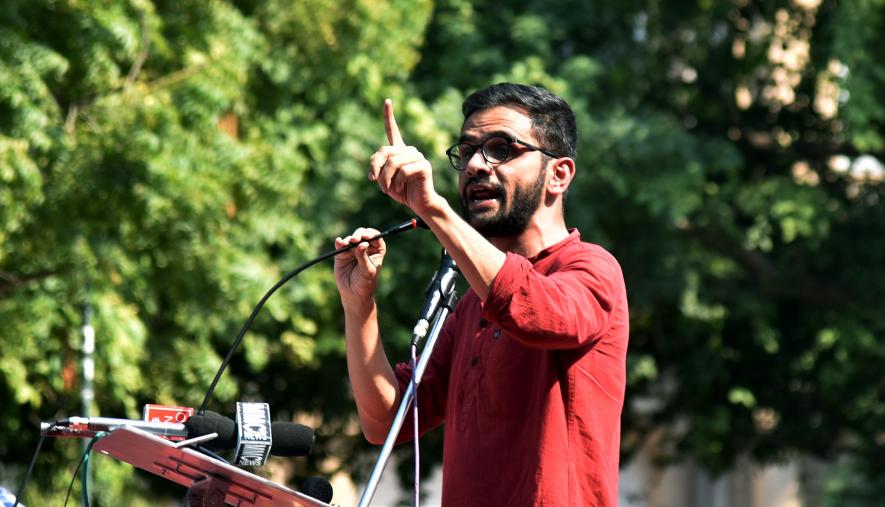
New Delhi: A city court on Thursday rejected former Jawaharlal Nehru University student and activist Umar Khalid’s bail application in the 2020 Delhi violence larger conspiracy case (FIR No. 59/2020), involving the Indian Penal Code (IPC) and stringent anti-terror law, Unlawful Activities Prevention Act (UAPA). Additional Sessions Judge Amitabh Rawat finally pronounced the order after deferring it thrice. The court had reserved the order on March 3.
Khalid was arrested on September 13, 2020. At least 53 people died, 750 suffered injuries and properties worth crores of rupees were lost in the communal violence that erupted on February 23 evening and continued till February 27 last year in the Trans-Yamuna area of northeast Delhi.
However, the order does not seem to have come as a surprise for Khalid’s family and well-wishers, many of whom said the tone and tenor of bail order of co-accused Ishrat Jahan -- who recently walked out of Tihar central prison in Delhi after the same special court enlarged her— was an indication of what’s in store.
Granting bail to Jahan on March 14 on grounds that she was not behind the idea of “chakka-jaam” (road blockade) and member of the organisations or “incriminating” Whatsapp group (Delhi Protests Support Group or DPSG) that “played role” in the entire “conspiracy”, the court had declared that it took the chargesheet on “face value” to conclude that there was a “premeditated conspiracy” of the “disruptive chakka-jaam” and a “preplanned” protest was organised at 23 different “planned” sites in Delhi to “incite” confrontation and violence.
“There was an intentional blocking of roads to cause inconvenience to the community residing in northeast Delhi and disruptions of essential services. The target was to block roads at mixed population areas and encircle the entire area to stop entry and exit of citizens to create panic,” Rawat had noted in the order.
He reportedly echoed the prosecution’s theory that women were “used” in the protest (against the Citizenship Amendment Act or CAA, the National Register of Citizens or NRC and the proposed National Population Register or NPR) in front as a “shield”. The alleged planning and its execution, according to him, comes under the definition of a terrorist act.
“The weapons used, manner of attack and the destruction caused show it to be preplanned.... The entire conspiracy is stated to involve various groups and individuals who coordinated with each other in carrying out the confrontational chakka-jaam in the guise of protest. It resulted into violence and riots in northeast Delhi,” the court had said, believing that the accusations against the accused are prima facie “true”, as per Section 43D of the UAPA.
The Section prescribes that bail shall not be granted if the court thinks the prosecution case is ‘prima facie’ true. The statute endorses a merit-based test of the charges levelled against an accused while deciding bail. And the merits of a case include materials against the accused.
Commenting on Thursday’s order, Khalid’s father, Syed Qasim Rasool Ilyas, said he was not surprised at the denial of bail. “It’s an unfortunate order, but I am not surprised. It appears to have been drafted at the commandments of the government, not the honourable judge so that the voices of dissent can be curbed,” he alleged.
“The case is very weak and the allegations against all accused are concocted. Our counsel (Senior Advocate Trideep Pais) had point-wise demolished the prosecution’s theory. The statements of the police witnesses were found to be contradictory. It was established that Umar Khalid was not in Delhi when the riots broke out. Therefore, projecting him as a mastermind of the alleged conspiracy is nothing but concoction of the highest order, which the court unfortunately believed despite the prosecution’s utter failure to prove the charges,” he told NewsClick.
Ilyas further said a select portion of a speech that Khalid had delivered at Amravati in Maharashtra on February 17, 2020, was presented by the prosecution as evidence to prove that he “incited” violence.
“We played out the entire speech in the court and asked the judge to point out what was objectionable in the entire public address. We asked the prosecution about the source of the video clip they produced. The reply was Republic TV, which had lifted it from the tweet of Bharatiya Janata Party’s IT cell chief Amit Malviya. So, in short, it was proved beyond any doubt that the charges were false. The court had enough ground to allow the bail application,” he added.
CHARGESHEET READS LIKE SCRIPT OF ‘FAMILY MAN’
Refuting the allegations against Khalid, Pais had argued that the entire chargesheet sounded like the script of web series ‘Family Man’ (a spy drama), having no evidence to support the charges that his client was a “veteran of sedition”.
He had argued that the “hyperbolic allegations” in the chargesheet read like a 9 p.m news script of one of those “shouting news-channels” and are reflective of the “fertile imagination of the investigating officer”.
With regard to Khalid’s speech, Pais had argued that News 18 and Republic TV (two news broadcasters) ran a “truncated” version. “Delhi Police has nothing but Republic TV and News18 for the case,” the lawyer had submitted.
News18 omitted Khalid’s crucial statement with regard to the need for unity and harmony from the video telecast by it, he had alleged.
Opposing the prosecution’s claim that the chakka jam was equal to a terror act, he said road blockade was not an offence and had been done earlier in different agitations.
Pais alleged that the statements made by police witnesses were “cooked up” and showed a pattern of “false implication” in the chargesheet as well as in FIR 59/2020. He had argued that one witness was recorded three days before Khalid’s arrest with the sole aim to justify his custody.
Khalid’s counsel alleged that the investigating agency “fabricated” statements in the matter as these were “grossly inconsistent” with each other, and there was no physical evidence to support the same.
“I recently watched a movie called ‘The Trial of Chicago 7’ where witnesses of the State had already planned to be the witnesses of the State,” the counsel had argued.
Rubbishing the Delhi Police allegation that the anti-CAA protests were “communal” in nature, Pais had argued “it was the Delhi Police which was communal, not the agitation against the controversial legislation”.
REFERENCE TO MOVIES AIMED AT CREATING PERCEPTION
The prosecution, opposing Khalid’s bail plea, had argued that reference to movies was an attempt to create “perceptions” because the defence had nothing to argue on the merits of the case.
“He (Pais) wants the application to be decided by a reference to a web series. He wants case to be equated as ‘Family Man’ and ‘Trial of Chicago 7’. It is slightly unfortunate. Let us understand why he wants to equate with Family Man or Chicago 7. Because when you have nothing on merits, you want to go and create headlines,” Special Public Prosecutor Amit Prasad had argued, adding that “you create a perception and it is for this reason if we do a Google search of the dates of hearings, when law is argued that does not get covered. When Family Man is argued, then everything gets covered. The idea is to create a perception. You don’t want to argue anything on law, you want to argue on something which is relevant in the media”.
He had also objected to the defence, alleging that the investigating agency was communal, as that the riots were “meticulously planned”. Since there was a planning involved, destruction of properties and disruption of essential services took place and stones, lathis and petrol bombs were used, the case attracted 15(1))a)(i),(ii) and (iii) of the UAPA.
The prosecution argued that protests sites were “strategically” selected closer to 25 mosques. A “communal” protest was given secular names to legitimise it.
Prasad had also argued that the protests were not aimed at opposing CAA or NRC but to embarrass the government and do something to attract the attention of international media.
Regarding Khalid, he had alleged that the public perception of the accused was to protect the Constitution and wave the Indian flag, but his agenda was different.
The entire argument of the prosecution was centred around the DPSG Whatsapp group, which it called “highly sensitive” wherein every small message was privately deliberated upon and passed on to other members. “Every decision taken there was conscious and well-thought over,” he had argued.
Of the total 15 accused in this case, five (Safoora Zargar, Asif Iqbal Tanha, Natasha Narwal, Devangana Kalita and Ishrat Jahan) are out on bail. The rest 10 (JNU student Sharjeel Imam, Umar Khalid, Jamia Millia Islamia research scholar Meeran Haider, Jamia Alumni Association chief Shifa-ur-Rahman, activists Khalid Saifi, Shadab Ahmad, Tasleem Ahmad, Salim Malik, Mohammad Saleem Khan and Athar Khan) have been languishing in jail for around two years.
Get the latest reports & analysis with people's perspective on Protests, movements & deep analytical videos, discussions of the current affairs in your Telegram app. Subscribe to NewsClick's Telegram channel & get Real-Time updates on stories, as they get published on our website.













